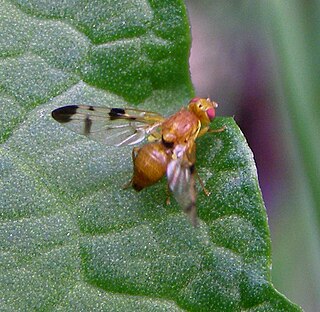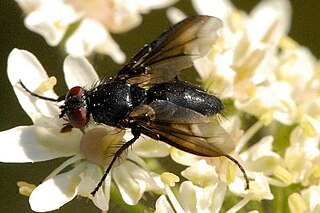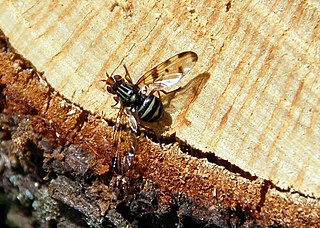| Carpomya | |
|---|---|
 | |
| Carpomya schineri | |
| Scientific classification | |
| Kingdom: | |
| Phylum: | |
| Class: | |
| Order: | |
| Family: | |
| Subfamily: | |
| Genus: | Carpomya |
| Synonyms | |
| |
Carpomya is a genus of tephritid or fruit flies in the family Tephritidae. [1] [2]
| Carpomya | |
|---|---|
 | |
| Carpomya schineri | |
| Scientific classification | |
| Kingdom: | |
| Phylum: | |
| Class: | |
| Order: | |
| Family: | |
| Subfamily: | |
| Genus: | Carpomya |
| Synonyms | |
| |
Carpomya is a genus of tephritid or fruit flies in the family Tephritidae. [1] [2]
Some uncertantainy about the limits to the genus include difference in placement of: [3]
Vidalia is a genus of tephritid or fruit flies in the family Tephritidae. Vidalia are commonly found distributed from the Eastern Palearctic to Oriental and Australasian. They breed in the fruits of Heptapleurum oxyphyllum var. oxyphyllum, a member of family Araliaceae, in West Malaysia.

The Tephritidae are one of two fly families referred to as fruit flies, the other family being the Drosophilidae. The family Tephritidae does not include the biological model organisms of the genus Drosophila, which is often called the "common fruit fly". Nearly 5,000 described species of tephritid fruit fly are categorized in almost 500 genera of the Tephritidae. Description, recategorization, and genetic analyses are constantly changing the taxonomy of this family. To distinguish them from the Drosophilidae, the Tephritidae are sometimes called peacock flies, in reference to their elaborate and colorful markings. The name comes from the Greek τεφρος, tephros, meaning "ash grey". They are found in all the biogeographic realms.

The Ulidiidae or picture-winged flies are a large and diverse cosmopolitan family of flies (Diptera), and as in related families, most species are herbivorous or detritivorous. They are often known as picture-winged flies, along with members of other families in the superfamily Tephritoidea that have patterns of bands or spots on the wings. Some species share with the Tephritidae an unusual elongated posteroapical projection of the anal cell in the wing, but can be differentiated by the smoothly curving subcostal vein. Two species, Tetanops myopaeformis and Euxesta stigmatias, are agricultural pests.

Hybotidae, the typical dance flies, are a family of true flies. They belong to the superfamily Empidoidea and were formerly included in the Empididae as a subfamily.
Orotava is a genus of tephritid or fruit flies in the family Tephritidae.

Merzomyia is a genus of tephritid or fruit flies in the family Tephritidae.
Platensina is a genus of tephritid or fruit flies in the family Tephritidae.

Terellia is a genus of tephritid or fruit flies in the family Tephritidae.

Trypeta is a genus of tephritid, or fruit flies in the family Tephritidae.

Urophora is a genus of tephritid or fruit flies in the family Tephritidae.
Urophora cuspidata is a species of tephritid or fruit flies in the genus Urophora of the family Tephritidae.

Dexiinae is a subfamily of flies in the family Tachinidae.

Dexiini is a tribe of flies in the family Tachinidae.

Otitinae is the name of a subfamily of flies in the family Ulidiidae. It was formerly the Otitidae. Like the Ulidiinae, most species are herbivorous or saprophagous. Most species share with the Tephritidae an unusual elongated projection of the anal cell in the wing, but can be differentiated by the smoothly curving subcostal vein. Most are dull gray to shiny brown or black flies with vein R1 setulose or, in a few cases, bare.

Urophora quadrifasciata is a species of tephritid or fruit flies in the genus Urophora of the family Tephritidae. The host plant for the larvae is usually a knapweed, and because of this, it is used to control Centaurea stoebe.

Goniglossum wiedemanni is a species of tephritid or fruit flies in the family Tephritidae, and the only species in the genus Goniglossum.

Dithryca is a genus of the family Tephritidae, better known as fruit flies.

Tephritis arnicae is a species of picture-winged fly of the family Tephritidae, which are variously known as fruit-flies or gall flies.

Terellia is a subgenus of tephritid or fruit flies in the family Tephritidae.

Myopitini is a tribe of tephritid or fruit flies in the family Tephritidae.